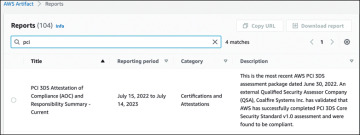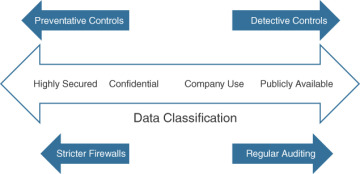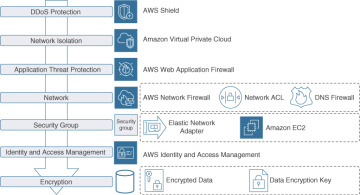Data Access and Governance
Many on-premises and AWS-hosted workloads store their associated data records in the AWS cloud. Personal data stored in the public cloud is sometimes defined as personally identifiable information (PII). Sensitive data types, such as PII, must be protected to comply with privacy regulations such as the General Data Protection Regulation (GDPR), laws such as the Health Insurance Portability and Accountability Act (HIPAA), and industry standards such as the Payment Card Industry Data Security Standard (PCI DSS). More than 13 billion data records have been stolen since 2013, according to the 2022 Thales Data Threat Report (https://cpl.thalesgroup.com/data-threat-report). AWS Artifact, located in the AWS Management console, provides on-demand access to all current AWS compliance and security reports, including Service Organization Control (SOC) and Payment Card Industry (PCI) reports and certifications from accreditation bodies validating the implementation and operating effectiveness of AWS security controls (see Figure 5-2).

Figure 5-2 AWS Artifact PCI Report
Data Retention and Classification
When classifying data, it’s important for each organization to implement data retention policies for each class of stored data. Organizations should design security policies using security zones for all data records, and data classification requirements based on how data is stored and who has access to it (see Figure 5-3). Defined security zones for data records range from highly protected to publicly accessible.

Figure 5-3 Classification of Data Records
Security zones are typically used to segregate different types of organizational data assets based on their sensitivity or importance, with the most sensitive or valuable data being placed in the highest security zone. This segregation enables organizations to implement different levels of security controls and access restrictions based on the sensitivity of the data, ensuring that only authorized users with the appropriate level of clearance can access and view sensitive data records.
Additionally, the creation of relevant security zones can help organizations prevent the spread of security breaches by limiting the potential impact to a specific area of the organization. Organizations also should create a network perimeter with defined network flow and access policies for data records defining where and how data can be accessed. Defense-in-depth security at AWS is applied using infrastructure security controls, AWS IAM security policies, and AWS detective controls (see Figure 5-4).

Figure 5-4 Preventative Controls
Infrastructure Security
Infrastructure security requires deploying the following protections:
DDoS Protection: Amazon deploys AWS WAF and Shield to protect the AWS cloud from DDoS attacks.
Network isolation: EC2 instances must be hosted in a virtual private cloud (VPC). Many AWS services can be accessed from a VPC with private VPC endpoints (Interface and Gateway endpoints), ensuring workload traffic remains on the private AWS network.
Application-layer threat protection: The AWS Web Application Firewall (WAF) allows organizations to create rules and filters to accept or reject incoming requests to Amazon CloudFront distributions, Amazon API Gateway deployments, and Application Load Balancers, and HTTP/HTTPS traffic to web servers.
Security groups: Security groups must be designed to allow ingress traffic from associated security groups.
Network ACL: Design network ACLs to implement zone-based models for your workload (web/app servers/database), allowing only legitimate traffic to reach each subnet.
IAM Controls
AWS Identity and Access Management (IAM) policies are useful for controlling access to the data layer (database, queue, AWS EBS volumes, shared data [AWS EFS and AWS FSx for Windows File Server], and Amazon S3 storage) and managing IAM user and federated user activity and infrastructure security. Separate administrative tasks should be created for Amazon RDS with IAM policies (see Example 5-1) that control access to database data records. For authentication and authorization to any workload or organizational data records, enable multifactor authentication (MFA) for all administrators and end users.
Example 5-1 Administrative Access to Amazon RDS
Detective Controls
Detective controls are a type of security control designed to detect and alert when potential security incidents or breaches occcur. Detective controls typically are used with preventive and corrective controls forming a comprehensive security strategy. Examples of detective controls at AWS include intrusion detection systems, and auditing or logging systems that monitor user activity and alert on suspicious behavior. The goal of detective controls is to identify potential security threats or vulnerabilities before they can cause harm, allowing organizations to take appropriate action to prevent or mitigate the impact of a security incident.
Detective controls are an important part of a defense-in-depth security strategy as they provide an additional layer of protection by detecting and responding to potential security threats. Detective controls at AWS include the following security services:
VPC Flow Logs: A feature of Amazon VPC that monitors network traffic at the elastic network interface, subnet, or entire VPC. Captured network traffic can be used for troubleshooting connectivity issues and to check current network access rules.
AWS CloudTrail: Continuously monitor and record API usage and user activity across AWS infrastructure.
AWS CloudWatch: Monitors AWS cloud services such as Amazon RDS databases, EC2 instances, and DynamoDB tables and hosted applications by collecting and tracking metric data, application and operating system log files, and using automated responses to defined alarms.
Amazon GuardDuty: Provides continuous threat detection and analysis of VPC Flow Logs, Amazon Route 53 DNS query logs, and AWS CloudTrail S3 data event logs, and protecting AWS accounts and data stored in Amazon S3 from malicious activity. AWS GuardDuty malware protection can help detect malicious files stored on EBS volumes, protecting attached EC2 instances and Amazon Elastic Kubernetes Service (EKS) clusters.
AWS Config: Detects configuration changes in RDS AWS infrastructure including Amazon RDS, EC2 instances, VPC and database architecture, including security groups, database instances, snapshots, and subnet groups.
Amazon Macie: Uses machine learning and pattern matching to protect Amazon S3 objects and sensitive data types.
Access Analyzer for S3: Monitors Amazon S3 buckets and details public or cross-account access.
Amazon Detective: Graphically analyzes AWS CloudTrail management events, VPC Flow Logs, AWS GuardDuty findings, and Amazon EKS audit logs to help identify the cause of potential security issues.
